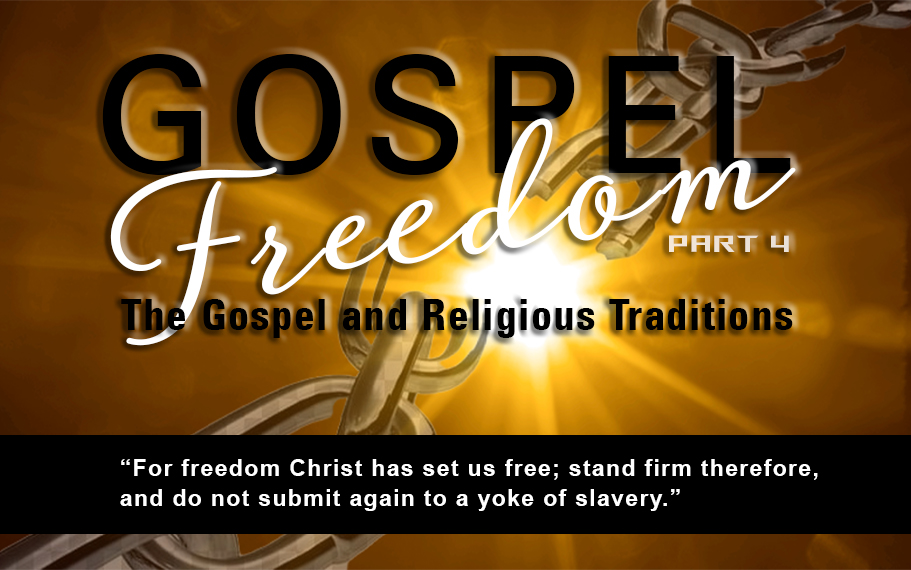The Gospel and Religious Traditions
During the earthly ministry of the Lord Jesus, he demonstrated by both word and deed his abhorrence of human traditions. This is especially true when it came to how they obscured the plain meaning of the Law.
Scripture teaches that He (Jesus) never Himself violated God’s law; he upheld it so that his righteousness was never impugned. Theologians refer to this aspect of his life (his obeying the Law in thought, word, and deeds his active obedience (whereby his death on the cross is often called his passive obedience). In this way, his perfect righteousness through his obedience to the Law could be credited to our account so that justification is not only ‘just as if I had never sinned,’ but also ‘just as if I had always obeyed.’ What an incredible reality!
In his teaching, Jesus clarified the radical difference between the Law of God and human religious tradition. The religious leaders of his day studied not only the written Law but what eventually became known as the Oral Law. These were layers of oral instruction, replete with the traditions of the fathers. For these leaders, obeying the oral interpretations of the Law was commensurate with keeping the Law itself. But Jesus exposed their hypocrisy by demonstrating the difference between God’s Word and human tradition:
Now when the Pharisees gathered to him, with some of the scribes who had
come from Jerusalem, they saw that some of his disciples ate with hands that
were defiled, that is, unwashed. (For the Pharisees and all the Jews do not eat
unless they wash their hands properly, holding to the tradition of the elders, and
when they come from the marketplace, they do not eat unless they wash. And
there are many other traditions that they observe, (such as the washing of cups
and pots and copper vessels and dining couches). And the Pharisees and the
scribes asked him, “Why do your disciples not walk according to the tradition of
the elders, but eat with defiled hands?” And he said to them, “Well did Isaiah
prophesy of you hypocrites, as it is written, ‘This people honors me with their lips,
but their heart is far from me; in vain do they worship me, teaching as doctrines
the commandments of men.’ You leave the commandment of God and hold to
the tradition of men.”
You have a fine way of rejecting the commandment of God in order to establish
your tradition! For Moses said, ‘Honor your father and your mother’; and, ‘Whoever
reviles father or mother must surely die.’ But you say, ‘If a man tells his father or
his mother,“Whatever you would have gained from me is Corban”’ (that is, given to
God) then you no longer permit him to do anything for his father or mother, thus
making void the word of God by your tradition that you have handed down. And
many such things you do.
Mark 7:1-13
This is why Jesus made such a distinction between the Law of God and human tradition, and we must be careful to do so as well. Anyone who has been in and around the Church for any time has seen that if we are not careful, human tradition can soon destroy the freedom the Gospel of grace gives us. For example, I once was asked to sign a card stating that I wouldn’t go to a movie as part of my membership in a particular local church I sought to join. In the long run, avoiding the theater might be a good idea, but requiring it as a basis of church membership (rather than trusting the Spirit to guide the believer) is to exalt human tradition above the Gospel. And the same can be said about the many layers of tradition that often destroy the freedom of the Gospel of the grace of God.
The trouble is, we rarely recognize that we are doing this. One of my favorite quotes is by author John Samson who made the statement: “those who are most bound by tradition are those who don’t think they have any.” No truer statement could be made. Having spent over fifty years in church life, I have firsthand knowledge of how believers get caught up in bondage, all the while proclaiming they are free.
That’s why some of the most important words in all of Scripture are found in Romans chapter 14. It is one of the most freeing chapters in the entire Word of God. It must be understood in the context of the Roman church to whom it was written. The Roman assembly comprised of Jews and Gentiles, each with their various traditions. Some observed various days of the week for religious holidays, while others abstained from drinking wine. If there was ever a time that called for Paul to establish clearly defined rules to regulate the behavior of the church members, it was now. But Paul refuses to do it. Instead, he encourages believers to live according to the dictates of their conscience. In other words, grace became the determining factor in how one lived.
Ask God to give you an understanding of the ways you allow human tradition to distort the gospel of grace. You might be surprised at what you find. If you do, repent for putting these traditions above Scripture, and take your place once again, living by the grace of the gospel.



0 Comments